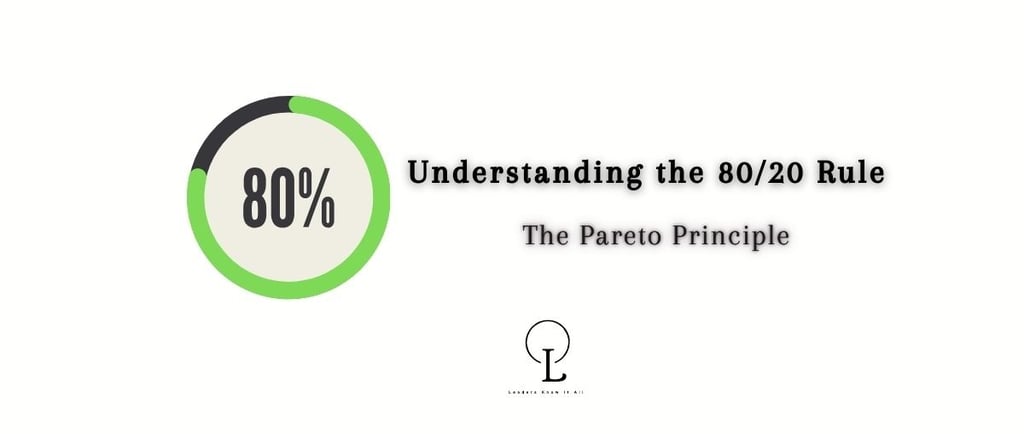Understanding the 80/20 Rule- The Pareto Principle
The 80/20 rule, also known as the Pareto Principle, is a concept that states that roughly 80% of the effects come from 20% of the causes. This principle can be applied to various aspects of life, including business, productivity, and personal development. Understanding and implementing the 80/20 rule can help individuals and organizations achieve greater efficiency and effectiveness in their endeavors.
SUCCESSLEADERSHIPHOW TO BECOME A GOOD LEADEREFFECTIVE PLANNINGLEADERSHIP TRAITSLEADERSHIP SKILLSSTRATEGIC PLANNINGLEADERSHIP QUALITIES80/20 RULEPARETO PRINCIPLE
leaders know it all
1/12/20244 min read


The 80/20 rule, also known as the Pareto Principle, is a concept that states that roughly 80% of the effects come from 20% of the causes. This principle can be applied to various aspects of life, including business, productivity, and personal development. Understanding and implementing the 80/20 rule can help individuals and organizations achieve greater efficiency and effectiveness in their endeavors.
What is the 80/20 Rule?
The 80/20 rule was named after the Italian economist Vilfredo Pareto, who observed that 80% of the wealth in Italy was owned by 20% of the population. This principle has since been found to apply in many other contexts including individual and organizational successes.
In simple terms, the 80/20 rule suggests that a small percentage of inputs or efforts often lead to a large percentage of results or outcomes. It implies that not all tasks, activities, or resources contribute equally to the desired outcome. By identifying and focusing on the vital few factors that have the most significant impact, individuals and organizations can optimize their efforts and achieve better results.
How to Apply the 80/20 Rule?
Applying the 80/20 rule involves a few key steps:
1. Identify the Key Factors
The first step is to identify the key factors that contribute to the desired outcome. This requires careful analysis and evaluation of the various inputs, tasks, or resources involved. By understanding which factors have the most significant impact, you can prioritize your efforts and resources accordingly.
2. Focus on the Vital Few
Once you have identified the key factors, it is important to focus your attention and resources on the vital few. These are the factors that have the most significant impact on the desired outcome. By dedicating more time, energy, and resources to these critical areas, you can maximize your results while minimizing wasted efforts on less impactful factors.
3. Eliminate or Delegate the Trivial Many
The 80/20 rule suggests that a significant portion of our efforts or resources may be spent on tasks or activities that contribute minimally to the desired outcome. It is important to identify these trivial many and either eliminate them or delegate them to others. By doing so, you can free up valuable time and resources to focus on the vital few.
4. Continuously Evaluate and Refine
The 80/20 rule is not a one-time exercise but rather an ongoing process. It is essential to continuously evaluate and refine your approach to ensure that you are still focusing on the most impactful factors. As circumstances change and new information becomes available, you may need to adjust your priorities and reallocate your resources accordingly.
How to Follow the 80/20 Rule?
Following the 80/20 rule requires discipline, focus, and a strategic mindset. Here are some tips to help you effectively implement and follow the 80/20 rule:
1. Set Clear Goals
Before applying the 80/20 rule, it is important to have clear goals in mind. Define what you want to achieve and identify the key metrics or outcomes that will indicate success. This will help you determine which factors are most critical to focus on.
2. Analyze Data and Metrics
Collect and analyze data and metrics to gain insights into the factors that have the most significant impact on your desired outcome. Use tools and software to track and measure the effectiveness of different inputs, tasks, or resources. This data-driven approach will provide valuable insights for applying the 80/20 rule.
3. Prioritize and Plan
Once you have identified the vital few factors, prioritize them and create a plan of action. Determine how much time, energy, and resources you will allocate to each factor. Set realistic deadlines and milestones to ensure progress and accountability.
4. Delegate and Outsource
Identify tasks or activities that can be delegated or outsourced to others. By doing so, you can free up your time and energy to focus on the critical factors that require your expertise and attention. Delegate tasks that are less impactful or can be done by someone else, allowing you to focus on high-value activities.
5. Regularly Review and Adjust
Regularly review your progress and results to determine if you are still focusing on the most impactful factors. Be open to adjusting your approach and reallocating your resources based on new information or changing circumstances. Flexibility and adaptability are key to effectively following the 80/20 rule.
Why is the 80/20 Rule Essential?
The 80/20 rule is essential for several reasons:
1. Efficiency and Productivity
By focusing on the vital few factors that have the most significant impact, you can achieve greater efficiency and productivity. You can allocate your time, energy, and resources more effectively, resulting in better outcomes and reduced wasted efforts.
2. Resource Optimization
The 80/20 rule helps optimize resources by ensuring that they are allocated to the areas that generate the most value. This prevents resources from being wasted on less impactful tasks or activities, allowing for better resource allocation and utilization.
3. Strategic Decision Making
Applying the 80/20 rule requires thoughtful analysis and evaluation of the factors that contribute to the desired outcome. This promotes strategic decision making and a deeper understanding of the key drivers of success.
4. Focus and Clarity
By following the 80/20 rule, you can maintain focus and clarity on the most critical factors. This prevents distraction and ensures that your efforts are aligned with your goals, leading to greater effectiveness and achievement.
In conclusion, the 80/20 rule is a powerful concept that can be applied to various aspects of life and work. By identifying and focusing on the vital few factors that have the most significant impact, individuals and organizations can achieve greater efficiency, productivity, and success. Implementing the 80/20 rule requires discipline, analysis, and continuous evaluation, but the benefits are well worth the effort.
Love and Light 💚
LKIA
